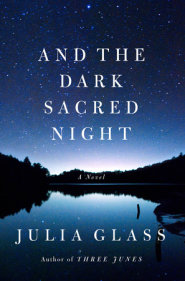 I
swiftly tumbled into Julia Glass’s enticing portrait of Kit Noonan and his very
domesticated life. Glass immediately captured me with Kit whose “only true
occupation these days . . . is fatherhood; his only reason for getting up at
this dismal hour is getting his children to school.” Kit, an unemployed art
historian in his early forties, is a model father but at the same time he’s treading
water in his marriage and his pursuit of employment. His wife wonders if his
not knowing who his father is and his inability to challenge his mother to
learn the man’s identity is causing his inertia. Unable to stand another moment
of stasis she forces him to seek out his stepfather, Jasper, for possible clues. Jasper is a typically nuanced Glass
character, an aging ski bum running a resort, teaching kids to ski, and
managing a dog sled team. Kit arrives
with an early blizzard that affords both men time to remember their joined
past. Jasper had promised Kit’s mother
that he’d never give away her secret but instead he decides it’s time to
connect Kit with Lucinda and Zeke Burns.
I
swiftly tumbled into Julia Glass’s enticing portrait of Kit Noonan and his very
domesticated life. Glass immediately captured me with Kit whose “only true
occupation these days . . . is fatherhood; his only reason for getting up at
this dismal hour is getting his children to school.” Kit, an unemployed art
historian in his early forties, is a model father but at the same time he’s treading
water in his marriage and his pursuit of employment. His wife wonders if his
not knowing who his father is and his inability to challenge his mother to
learn the man’s identity is causing his inertia. Unable to stand another moment
of stasis she forces him to seek out his stepfather, Jasper, for possible clues. Jasper is a typically nuanced Glass
character, an aging ski bum running a resort, teaching kids to ski, and
managing a dog sled team. Kit arrives
with an early blizzard that affords both men time to remember their joined
past. Jasper had promised Kit’s mother
that he’d never give away her secret but instead he decides it’s time to
connect Kit with Lucinda and Zeke Burns.
Lucinda
Burns makes this novel sing. Revered for
her charity work helping young, single mothers and her support of her state
senator husband, Lucinda is the grandmother we’d all love to have. Her husband’s
recent stroke has her thinking more about her son, Malachy, a music critic who
died of AIDS. Readers of Glass’s National Book Award winning novel, Three Junes, will recall Lucinda and
Malachy as well as Fenno McLeod, Malachy’s long-time friend who also reappears
in this novel. These characters lives soon intersect with Kit’s as he continues
to learn about his father’s identity and his mother’s reasons for resisting his
quest.
Soon
Kit is united with his father’s family and I felt like I was with them in their
awkward gathering with everyone jostling for position and searching for
identity in a shifting world in a setting that hadn’t changed for generations. I was deep in the rabbit hole which is why as
a reader I was utterly devastated when Glass threw in a grenade of a plot
device so abrupt and inconceivable that it made reading the last portion of the
book almost impossible. But continue to read, I did and the reward was a
sentimental, cloying ending that should have made me rejoice in what it means
to be a father, to live in an imperfect family, and to forgive but instead left
me yearning for the real Julia Glass to appear and call for a rewrite.
And
the title, oh, the title is a clever homage to Louis Armstrong’s “What a
Wonderful World” with “the bright blessed day and the dark sacred night.”
During couple’s therapy Fenno McLeod and his partner Walter’s therapist brings
up the song and Walter says, “Well, I am definitely the day, and boy is he ever
the night.” The therapist then notes that he must mean “that your past is like
the night: dark yet sacred.” I think Glass intended for readers to see each character’s journey as a way of honoring
the dark past and heading into the light of day but for this reader, it simply never
happened.
Summing
it Up: This novel is as uneven as a cobblestone street in an ancient Greek
city. The beginning two-thirds are vintage Glass with detailed sketches of
real people living life and trying to find answers to what it means to be a
family but the last third is its antithesis with a disastrous twist and a much-too-tidy
ending.
Rating:
3 stars (The first portion of the book is a 5 but the ending barely rises to a
2 thus I’ll call it a 3.)
Category:
Fiction, Grandma’s Pot Roast
Publication
date: April 1, 2014
Read
an Excerpt: http://www.bostonglobe.com/arts/books/2014/03/22/excerpt-from-and-dark-sacred-night-julia-glass/X2WN2aeGCDBWCqjNOJpa1M/story.html
What
Others are Saying:
The Boston Globe: http://www.bostonglobe.com/arts/books/2014/04/05/review-and-the-dark-sacred-night-julia-glass/oqUIaLKi9zTilOid9WMXCO/story.html
Wall Street Journal: http://online.wsj.com/news/articles/SB10001424052702303532704579478410789655366
